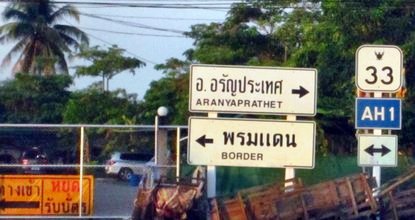
Immigration police have announced they are clamping down on tourists who remain illegally in Thailand by exploiting permission given to many foreigners to enter Thailand without a visa and remain up to 30 days at a time.
The clampdown does not affect holders of non-immigrant visas or holders of tourist visas who still have remaining entries permitted on their legal visas.
The crackdown aims at foreign visitors, particularly westerners, who do not hold a visa, but who exit and then immediately return to Thailand every 15 or 30 days to receive another stamp to extend their stay. A loophole aimed at helping short-term visitors allows foreigners from many countries to enter Thailand for between 15 and 30 days without a visa.
Effectively immediately, immigration officers at the borders may bar foreigners without a visa when they leave the country, usually at a land border point, and then immediately try to re-enter Thailand. The law permits immigration officers to give such travellers permission to re-enter for 15 to 30 days, or to deny them permission to enter.
Under the new rules, visitors who leave and then try to come back immediately may be stopped, and told they must first obtain a proper tourist or non-immigrant visa, and then return.
As of now, "visa runs", as many foreigners call them even though no visas are actually involved, will end for those using land borders. They will also be restricted or ended by air as of Aug 12.
Tourists of all nationalities are being checked thoroughly at all borderpoints for visa validity, said Chatichai Ieamsang, commander of the Immigration Bureau's Division 4.
The "visa run" is not in line with the intent of tourism promotion and the National Police recently ordered a review of the regulation. The number of visitors who effectively reside in Thailand on the back of such visa runs is not known, but many communicate via internet forums, and there seem to be a large number. Typically, they have stayed in Thailand to retire, or even to work, both of which are illegal without proper visas.
Officials at borderpoints will use their discretion on a case-by-case basis.
If a re-entry is made once or twice, a foreigner may be allowed to re-enter Thailand. But if he has done so multiple times, he may need to be interrogated, the officer said.
Foreigners who cannot convince officials they are tourists will be advised to apply for a proper Thai visa if they wish to remain in the country.
"They can do so in neighbouring countries. The closest is Vientiane, which will cost them 1900 baht. We're strict about this because 90% of all foreigners making re-entries actually work in Thailand, mainly as language instructors.
"It will also prevent corruption as there are officials who claim they could help these foreigners.
"Today we found a South Korean who has done this seven times. It turns out he has a Thai wife in Nakhon Ratchasima. In his case, we didn't allow him to re-enter because he is not a tourist," Pol Maj Gen Chatchai said.